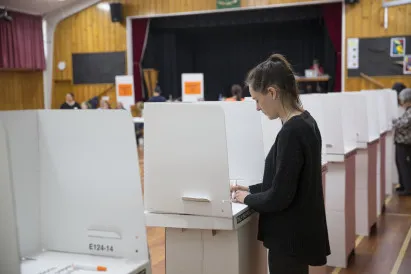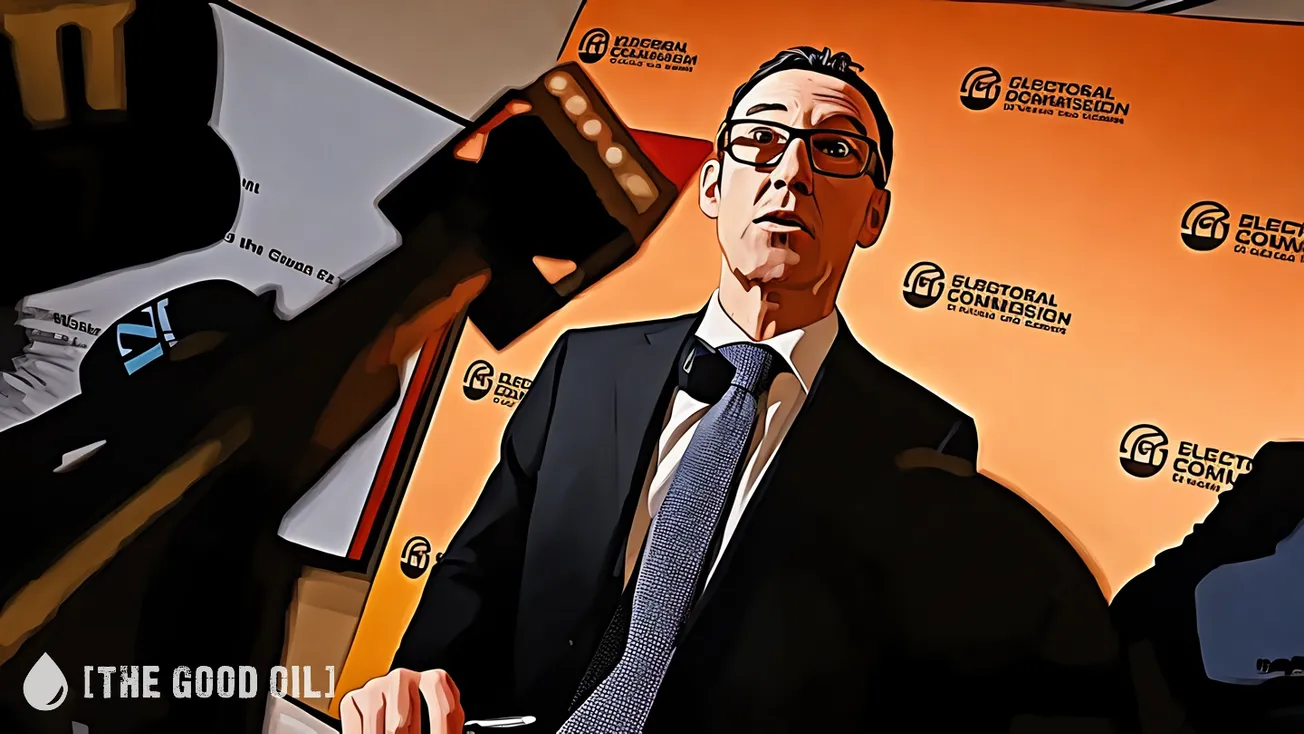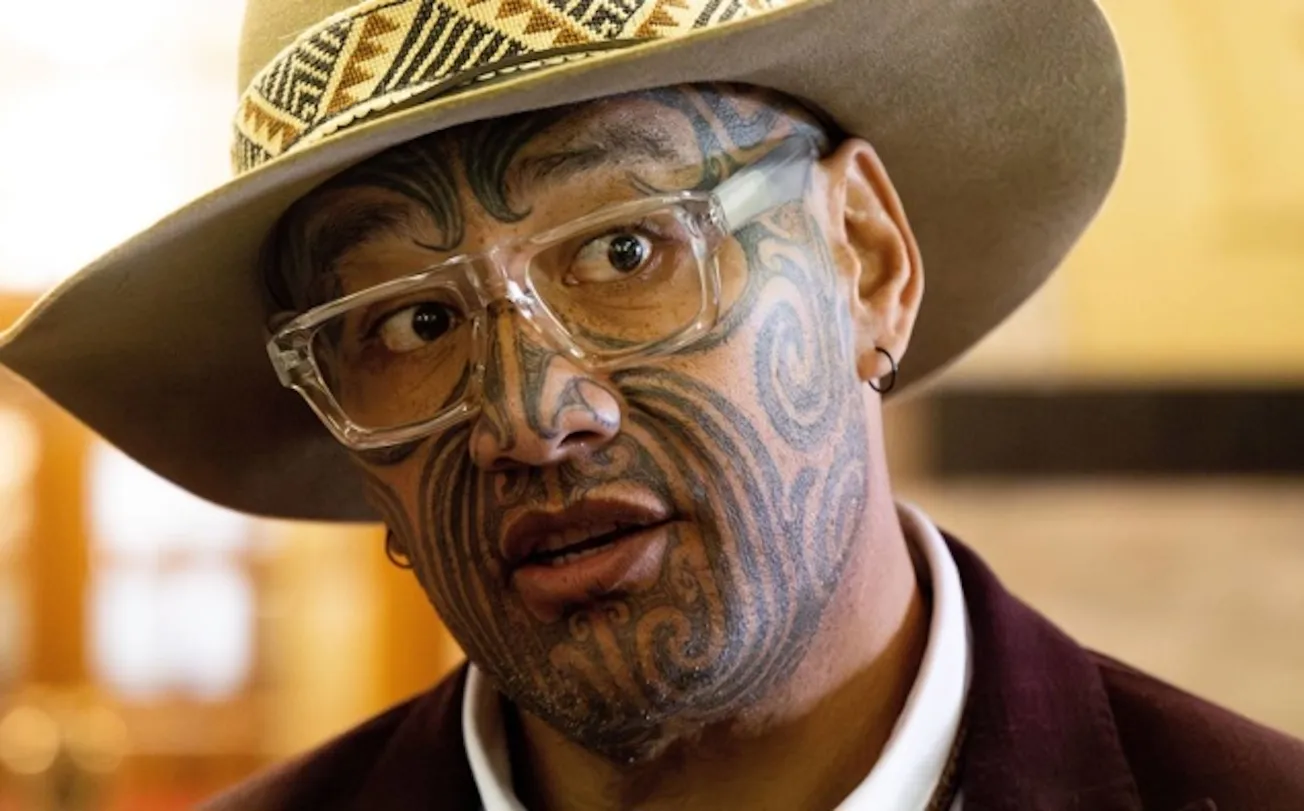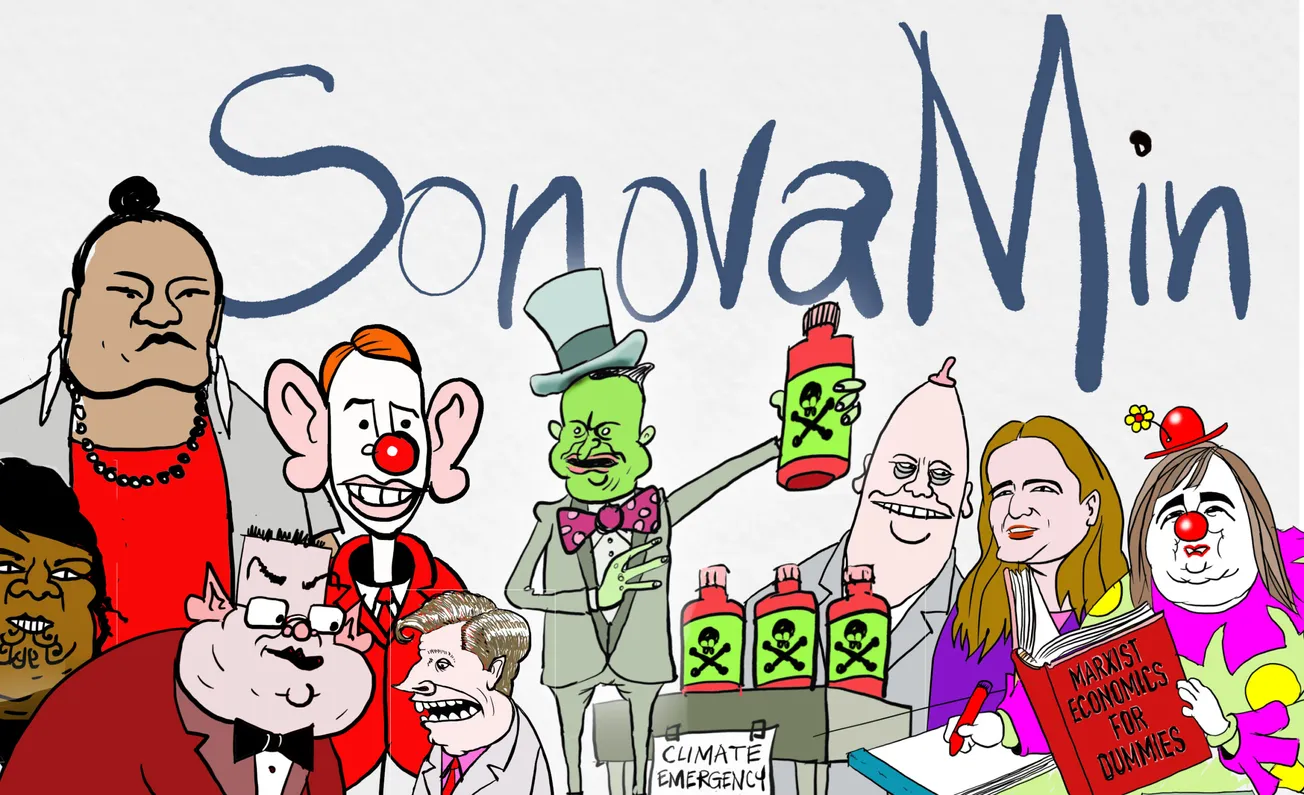Table of Contents
Dr Muriel Newman
“Our Governments have great powers and great responsibilities. Their exercise of those powers and fulfilment of those responsibilities is legitimate only because it arises from the consent of the people, or, to put it another way, because it is based on the political sovereignty of the people.”
Towards a Better Democracy: the 1986 Royal Commission into the Electoral System.
We are now only days away from election night’s ‘big reveal’, when we find out the direction of the country for the next three years.
Will we enter a new era of hope and opportunity?
Or will we be condemned to three more years of chaos as Labour, in coalition with the radical Greens and Maori Party (which says it doesn’t believe in democracy yet happily takes the trappings of office), impose their authoritarian agenda onto our country, undermining democracy, free speech and the Rule of Law?
If Labour wins there will be a literal exodus of Kiwis from New Zealand – those who are not be prepared to subject themselves to three more years of destructive socialism.
And while a government of some combination of National, ACT, and New Zealand First may not be the dream alternative some were hoping for, at least it would close the door on the disastrous Ardern era.
This election has cast further doubts about the integrity of New Zealand’s mainstream media.
If we cast our minds back to the last ‘normal’ election in 2017, their focus was on holding the incumbent National Government to account. Day after day, we were bombarded with stories about hospital waiting lists, homelessness, and high immigration rates.
Yet after six years of Labour, with those issues more chronic than ever, the media has hardly given them a mention. Instead, their overwhelming focus appears to be on helping Labour undermine the credibility of a potential National-led government.
Discrediting an alternative government is, of course, Labour’s main election strategy. Since it cannot campaign on its disastrous record in office, it’s hoping to win by default. Whether the media’s seeming assistance is due to the fact that Labour’s $55 million Public Interest Journalism Fund payments are not scheduled to end until January 2026, or to the innate left-wing bias of newsrooms, is not clear. But apart from some stand-outs – particularly Newstalk ZB – the media is giving the appearance of being Labour’s propaganda arm.
The debate over tax is a case in point.
The bigger picture is, that in a country awash with profligate spending, Labour plans to increase tax, while National plans to lower tax.
Under Labour, bracket creep will ensure Kiwis pay an extra $3-4 billion in tax over the next four years, while National plans to eliminate bracket creep and provide tax relief.
But by obsessively attempting to discredit National’s lower tax plan, the media has appeared so dangerously one-sided and biased, that the new government should include a full inquiry into media reporting of the election in the review that follows every general election.
Three years ago, on election night, Prime Minister Jacinda Ardern promised to govern for all New Zealanders: “To those amongst you who may not have supported Labour before… I can promise we will be a party that governs for every New Zealander.”
Yet barely three months later, using Parliamentary urgency, she crushed the fundamental democratic right of New Zealanders to veto council decisions to introduce Maori wards.
The Herald’s Chief Political Reporter at the time, Audrey Young, was scathing about the deceit:
“The Government has made a strong case for abolishing local voters’ ability to overturn a council’s decision to establish a Maori ward. So it is unforgivable that Labour did not put it in its 2020 election manifesto. Local Government Minister Nanaia Mahuta foreshadowed the move in November, within weeks of the October election. It was clearly on Labour’s agenda all along. It may be a divisive issue but there is no excuse for Labour having hidden it at the election. No doubt Labour feared it could strengthen the arm of Act or, more importantly, of New Zealand First and did not want to take the risk of saying what it wanted to do in case the issue cost it votes.”
It turned out that abolishing petition rights wasn’t the only policy that Labour kept from the public. Their whole co-governance agenda, prescribed in the He Puapua report, was also deliberately hidden.
The problem is that New Zealand’s constitutional conventions are very clear – to be legitimate major constitutional change requires the approval of voters either through an election or a binding referendum.
Since He Puapua transfers democratic rights and public resources to the tribal elite, it represents major constitutional change. But with Labour securing no public mandate for He Puapua, all policy enactments are illegitimate. That includes race-based quotas in government tendering, the Maori Health Authority, Three Waters, and the requirement for all government agencies and many private sector organisations to commit to a Maori worldview and co-governance.
If there’s a change in government, scrapping all He Puapua measures should only be the start.
The massive He Puapua deception of New Zealanders, orchestrated by Labour and iwi leaders, should not only be punished at the ballot box but steps must be taken to prevent any takeover attempts in the future.
Since the Maori seats have now become a state-funded vehicle for activists pushing for Maori supremacy, a referendum needs to be held to give all New Zealanders the right to decide whether the Maori seats in Parliament and Local Government should be retained or abolished. This should be a priority for the incoming government.
A second priority is that New Zealand should withdraw from the United Nations Declaration on the Rights of Indigenous People. Although this is a non-binding accord, it was nevertheless used by radicals in their attempted takeover of New Zealand’s democracy.
And thirdly, since the Ardern-Hipkins Labour Government has been using the Waitangi Tribunal’s reinterpretation of the Treaty of Waitangi as a “partnership” between Maori and the Crown to justify their co-governance agenda, the official interpretation of the Treaty needs to revert back to its original meaning. That has been outlined by the great Maori leader Sir Apirana Ngata in his 1922 explanation of the Treaty as an agreement between the Crown and Maori that established the Queen as our sovereign, introduced private property rights, and gave all New Zealanders equality under the law.
Since the Waitangi Tribunal has been captured by extremists and has been instrumental in the tribal takeover attempt, it must also be wound up.
Another urgent change that needs to be made by the new government relates to the economically and socially reckless Zero Carbon agenda that Jacinda Ardern and the radical Greens inflicted on the country.
All of the dangerously harsh restrictions that have been introduced are based on measures that the United Nations has now abandoned because they are too extreme. Yet Labour has irresponsibly refused to correct their now-discredited climate models even though they are costing New Zealanders dearly.
Not only are Kiwis now paying too much for all New Zealand goods and services, but communities are being penalised as councils throughout the country use Labour’s excessive sea level rise predictions in their coastal planning rules.
The new government must review all climate policies as a priority, so they too do not force Kiwis to pay more than they should for petrol, food and everything else.
This week’s NZCPR Guest Commentator former MP and Federated Farmers President Owen Jennings explains what these errors mean for our major export industry:
“Right now, the Government, National and most of the larger parties state that New Zealand agriculture is responsible for ‘nearly half of all our greenhouse gas emissions’. The Green party would want us to think its somehow even worse than that. These parties have created their emissions’ policies on this basis.
“All of them are wrong. Badly wrong. So dangerously wrong that they are willing to sacrifice some 25% of our sheep and beef sector and 5% of our dairy industry. That’s Government modelling numbers.”
Owen’s call for political leadership is one that most Kiwis could support:
“We need a government that stands up for us, for truth and scientific reality and does not buckle to shenanigans fostered by misguided green groups.”
Finally, a few words about the election.
Isn’t it interesting that while National has rolled out former PM John Key to rally the troops, Labour’s former PM is nowhere to be seen. While Dame Jacinda Ardern has miraculously found enough in the tank to campaign on the world stage as a leader in the censorship of free speech – here at home she’s considered so toxic that Labour cannot even use her to support their failing campaign!
So, what should we be watching out for on election night?
Of particular interest will be Labour’s vote. At the last election, they won 50.01 per cent of the party vote, which, taking the ‘wasted vote’ into account, gave them 65 MPs – 46 electorate MPs and 19 list MPs.
With the latest polls showing Labour’s support at around 26 per cent, they will be entitled to only 31 MPs or so. Depending on how many electorates the party holds – they won 29 in 2017 – many high-ranking list-only MPs could lose their seats. Those at risk include Cabinet Ministers Willie Jackson at number 8 on the list, Andrew Little at 12, David Parker at 13, and former Speaker Adrian Rurawhe at 11.
Other Cabinet Ministers under threat if there’s a strong swing to National include Damien O’Connor on the West Coast at 10 on the list and Kieran McAnulty in the Wairarapa at 16.
Other battles of interest include Labour’s Greg O’Connor in Ohariu, who’s being challenged by National’s Deputy Leader Nicola Willis; Wellington Central, where vote splitting between Labour and the Greens could see the National candidate come through; Auckland Central where Labour voters supporting the Green Party’s Chloe Swarbrick may see her retain the seat; and Ilam where the TOP leader has wooed the media into thinking he may win the seat – in spite of it probably going back to National.
There’s a big question mark over the seven Maori seats. They are the battlefield where factions within Maoridom are fighting for dominance. With the Maori Party supported by younger radicalised activists, while an older cohort supports Labour, both parties are bullish about their chances.
If any party wins more constituencies than their share of the party vote entitles them to, they may create an overhang in Parliament. This has happened three times in the past, with the Maori Party creating a one-seat overhang in 2005 and 2011, and a two-seat overhang in 2008.
Also of interest will be the number of special votes, which traditionally favour the Greens and Labour, and which may reduce the election night seat tallies for National, ACT and New Zealand First.
Voter turnout will also be a major factor in this election. A low turnout will be bad news for Labour, as disgruntled supporters stay at home, while those wanting a change in government will be highly motivated to get out and vote.
At this stage, the polls are showing around 10 per cent of voters are undecided, and a further 6 per cent intend voting for parties polling well below the 5 per cent threshold for Parliament. Whether those minor party supporters stick with their favoured party, allowing their votes to effectively be reallocated to successful parties, or whether they will switch their vote to ensure it counts, remains to be seen. But collectively, these voters could have a significant influence on the final shape of our Parliament.
Let’s hope that one way or another, that as far as the future of our country is concerned, the election night result is one to celebrate!








